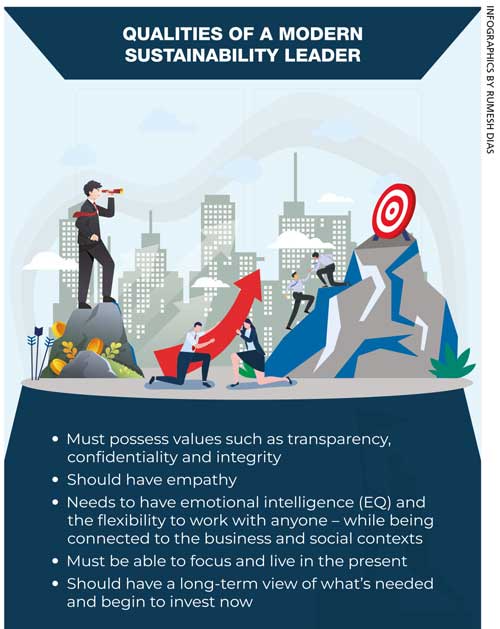
Leaders in sustainability do not have to be bosses. Nevertheless, they stand out as being (informal) change makers. They also bring out the best in others by being purposeful, kind, value-based and authentic.
FINANCIAL AND SOCIAL VALUE CREATORS
How to help transform society in a practical way – Kiran Dhanapala
The world is seeing activist leadership, which is a new concept in business. And activist leaders create change in society in a practical way. They recognise that success means delivering both financial and social value.
This relates to the implications of major social challenges that impact businesses and discerning where these entities can have an impact on the issue. It means businesses pivoting to become part of the solution even though they may also be part of the problem.
For example, a major plastics producer may act on plastic waste collection and recycling, and invest in R&D for alternative materials in the longer term.
While it may be useful to ask employees what matters to them, it is more valuable and practical to ask them where the organisation can make a material difference in the system in which they operate.
For instance, supermarket chain Tesco has a systemic global programme on food waste from product promotion to what consumers buy. Tesco’s business responsibility is to drive change by delivering social value; and as such, its staff are involved in donating food in areas where they live.
Some say that a leader with a corporate mindset plays the game whereas another with an activist mindset changes it.
Implementing corporate environmental, social and governance (ESG) practices in response to stakeholder pressure – even when ESG is not central to the business – leads to incremental progress. Such efforts are minimal and do not change the business model.
Author and Partner at Brunswick Group Lucy Parker asserts that an activist mindset is required to deliver social value. This focusses on addressing global issues an organisation is involved with, given the nature of its business. The issue impinges on the business and vice versa, and concentrates on where an organisation can make a difference.
For example, Apple wanted to minimise aluminium in its laptops after finding that it could not be recycled multiple times. So it invested in a new form of aluminium that could be recycled many times over.
When assessing the commercial benefits of engaging in global issues, it’s necessary to ask what benefits there are in not engaging in them.
Issues and their urgency can change as in the case of extreme weather events linked to climate change. The increasing frequency and severity of droughts and floods around the world requires speedy action in the short term, and a long-term mitigation strategy.
So the focus needs to be on how to take action, and deliver both financial and social value to stakeholders.
Empathy advocate and author Mimi Nicklin, who visited Colombo recently, noted that the ‘Great Resignation’ is related more to leadership than human resources. What she termed the ‘empathy deficit’ in organisations was most often responsible for toxic workplaces, a lack of meaning in work and resultant high staff turnover.
Businesses should focus on building skills sets in leaders that include empathy. Empathy is not an emotion or soft skill; instead, it’s a skill set that is data driven and seeking to understand. Insights are motivated by curiosity.
Nicklin added that in this era, it’s the more connected leader who will survive rather than the fittest. And that’s why it is so important for leaders to possess this particular skill set.
Leadership comprises skill sets that must be consciously built over time. Such skills are often contextual and generational. Providing youth leaders with knowledge on environmental and climate issues contributes to social value, and forms part of the skills required for a green, clean and just economy.
This new economy calls for change makers who are proactive and solution-oriented.
To nurture change makers and future activist leaders, we need to add entrepreneurship in activities, the curriculum and so on as this is a major requirement today. There is an emphasis on the need for social and sustainability entrepreneurs worldwide, as well as in Sri Lanka.
Businesses can gain inspiration by interacting with activist leaders on how to address problems in society with profit making solutions.
This content is available for subscribers only.





